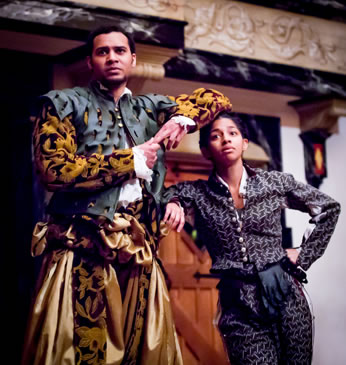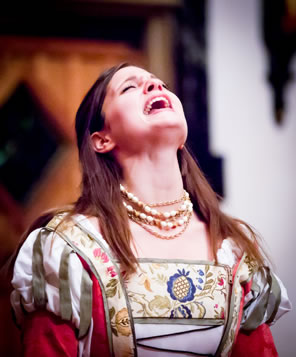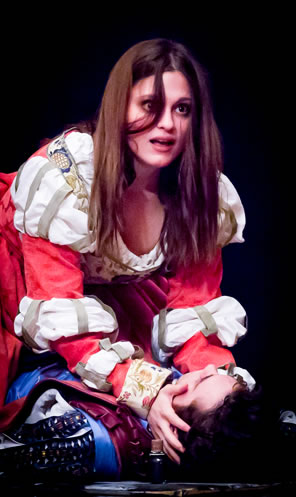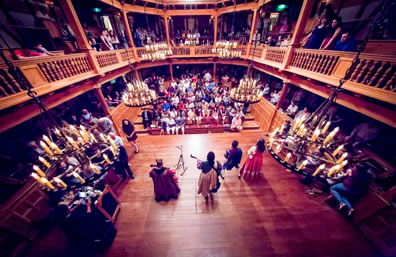Romeo and Juliet
There’s a First Time for Everything
American Shakespeare Center's Hungry HeartsTour, Blackfriars Playhouse, Staunton, Virginia
Sunday, September 4, 2016, C–6&7 (front middle stalls)
Directed by Benjamin Curns

Mercutio (Cordell Cole) hangs with Benvolio (Constance Swain) in the American Shakespeare Center's Hungry Hearts Tour production of William Shakespeare's Romeo and Juliet at the Blackfriars Playhouse. Photo by Tommy Thompson, American Shakespeare Center.
Time to party. Capulet and his clan greet the guests, including masquers with torches. We know Romeo and Benvolio are two of the masquers because they are members of the Montague family, “great enemy” to the Capulets, and crashing the party. We know Mercutio is another masquer because—
Well, because we’ve always seen it that way. I’d seen 26 productions of William Shakespeare’s Romeo and Juliet before this staging by the American Shakespeare Center (ASC) Hungry Hearts Tour troupe. However, before now I don’t recall seeing Mercutio as anything but a disguised, party-crashing conspirator with Romeo. Here, Mercutio (Cordell Cole) arrives in all his Mercutio glory. Greeted warmly by Capulet, Mercutio flirts with Lady Capulet and hangs with his kinsman Paris, who introduces him to Juliet. Mecutio was, after all, invited to this feast—he’s on the list of guests Romeo reads in a previous scene.
Romeo is the only one we know for certain who is in disguise: he takes the part of a torchbearer, and, at the party, Tybalt recognizes him by his voice. It makes sense for Benvolio to be in disguise, too. Mercutio does ask for a visor as he's heading for the party, but if none of the Capulets are masked, it makes perfect sense for him to discard it, as Cole's Mercutio does. After all, he is kin to the Prince of Verona and sixth on Capulet’s list of 10 invitees. Most directors overlook the obvious, even when they highlight Romeo’s reaction to Mercutio’s name on the guest list; by the time the party gets underway, Mercutio has become nothing more than a “consort” of Romeo’s (as Tybalt calls him).
Benjamin Curns, however, overlooks nothing. Nor am I making much ado about nothing, for in this Curns-helmed production we see how much Mercutio’s social status alters the dynamics of what comes after. Establishing Mercutio's status via the Capulet’s party deepens our comprehension of his relationship with Romeo (Josh Clark) vis a vis the great feud between the Capulets and Montagues. Mercutio hangs out with Romeo (as well as Benvolio, played here by Constance Swain) for the fun companionship and witty repartee, not that he is taking sides. Mercutio doesn’t hang out with Tybalt, probably because Capulet's nephew is a serious killjoy more than because of a general dislike of the Capulets; in his “king of cats” description, Cole’s Mercutio even speaks respectfully of Tybalt’s fencing skills. In the plaza on a hot day, Benvolio worries that the Capulets are coming; Mercutio cares not, an attitude which in Cole’s playing is simple truth rather than bravado. With Mercutio’s place in Verona so firmly established in the play, we also see in Ross Neal’s Tybalt the degree of his hatred for the Montagues if he is so willing to fight Mercutio for “consorting” with Romeo. That fight, though, is a formal duel with each mutually appreciated by the other, albeit Mercutio hams it up a bit.
What resonance, then, reverberates in Mercutio’s famous shout upon receiving Tybalt’s fatal sword thrust: “A plague o’both the houses!"
This is one of several significant examples of Curns’ thorough scrutiny of Shakespeare’s script, finding not-so-hidden-but-too-often-overlooked treasures and exploring their consequences through the finely honed performances of his talented cast. It is a quality that made Curns one of my favorite Shakespearean actors (his Richard III is Number One on my Top 40 Shakespeareances list), and now he’s fast becoming one of my favorite Shakespearean directors, though this is only the third play I’ve seen him formally direct. With his experience playing so many Shakespearean roles—including Nurse in ASC’s 2013 production of Romeo and Juliet—Curns brings vibrancy to his Shakespeare productions as he did his performances, a sense of seeing the plays in a totally new light despite his strict fealty to the texts; or, rather, because of his strict fealty, as what he finds in the texts have been there all along but their implications overlooked. As an actor-director he has a kindred spirit with the actor-playwright that was Shakespeare, and that kindred spirit he shares with the actors in his cast.
And the 11 actors in this Hungry Hearts Tour cast comprise one of the strongest ensembles I’ve seen on this (ASC’s Blackfriars Playhouse) or any stage. They nail the significant little moments that make big impressions in the overall portrayals of their characters.
- “Here’s much to do with hate, but more with love,” says Romeo (Josh Clark) in the opening scene when he realizes “what fray was here” before his arrival. Romeo is at this moment besotted with Rosaline and frustrated that she won’t give in to his advances, but Clark’s inflection points to how love can be the chief source of hate, especially in the blood ties that so grip Verona society.
-
“Younger than she are happy mothers made,” Paris (Kyle Powell) talking of the 13-year-old Juliet, points out to Capulet (J.C. Long); indeed, Juliet’s mother says she was Juliet’s age when she had her. “And too soon marr’d are those so early made,” Long’s Capulet barks back at Paris. Is he thinking of his own wife's too-soon motherhood, or is this the “careful father” Lady Capulet (Sara J. Griffin) later describes to their daughter—or is it both?

The two tragedies of a young girl growing up too fast in William Shakespeare's Romeo and Juliet in the American Shakespeare Center Hungry Hearts Tour production at the Blackfriars Playhouse. Above, Zoe Speas as Juliet wails that Nurse hasn't come home from meeting with Romeo after "three looooooooooonng hours." Below, Speas's Juliet sits on the prone corpse of Romeo (Josh Clark) and recognizes that her own time is too quickly coming to an end. Photos by Tommy Thompson, American Shakespeare Center.
- “Virtue itself turns vice, being misapplied; and vice sometimes by action dignified,” Friar Laurence (Andrew Goldwasser) meditates as he surveys the various “baleful weeds and precious-juicèd flowers” he has gathered that morning. He presents one “weak flower” in which “poison hath residence and medicine power.” This could very well provide the sleep-like-death potion Laurence gives Juliet, but more important, as Goldwasser stresses in his delivery, is how “Two such opposèd kings encamp them still in man as well as herbs, grace and rude will.” How succinctly has he described the Verona he will try to navigate—hoping for grace in a world of rude will—in serving Romeo’s and Juliet’s loves for each other.
- “O sweet Juliet, thy beauty hath made me effeminate, and in my temper softened valor’s steel!” Romeo shouts after Mercutio has been fatally stabbed minutes after Clark's Romeo had not only greeted Tybalt with brotherly affection but kissed him on both cheeks. “O calm, dishonorable, vile submission!” Mercutio rages at Romeo, the bro he thought had returned to his old self (a guy who would share in verbally assailing women on the streets). In the tour troupe repertory, Clark plays Proteus in The Two Gentlemen of Verona, and though he portrays Proteus and Romeo as two distinctly different characters, Clark playing both young men highlights the thematic similarities of Romeo and Proteus, whose personalities take sharp turns after they displace previous affections with new infatuations, Romeo toward grace, Proteus toward rude will.
- Nurse (Aleca Piper) finds the potion vial when she tries to awaken Juliet and immediately figures Juliet has poisoned herself. This is not in the text, but nothing in the text suggests Juliet has the time or even a reason to hide the vial before she passes out. This scene features Curns’ most noticeable textual cut as he curtails most of the “Oh woe!” lines, but this may be as much a practical decision as theatrical: Piper needs to get off stage to change from Nurse to Balthasar for the next scene informing Romeo of Juliet’s death.
- This production’s attention to minute details extends to the costuming designed by Victoria Depew. It’s not just the lush, Renaissance clothes the characters wear that wow but the exquisite craftsmanship in everything from the men’s ornate silk jackets and women’s embroidered dresses to Friar Laurence’s rope sandals.
- Romeo and Paris fight at the Capulet’s vault in such darkness they can’t see each other—though the whole theater uses universal lighting, so we can see all of this as if it were daylight. It adds an urgent danger to a moment that usually comes off as unnecessary intrusion in the march to the play’s tragic climax. Curns also serves as fight director and brings a considerable resume of skill and experience to the task (we saw real sparks fly in one of his ASC swordfights), ranging from the studied fencing duel between Mercutio and Tybalt to the rash-driven violence of Romeo’s assault on Tybalt. The opening brawl is so all-encompassing the audience might feel themselves in the middle of a classic bar fight, with the weapons of choice being not only swords and daggers but fists, too, and whatever furniture is handy.
- “You kiss by th’book.” Oh, the great conundrum of Juliet’s comment after Romeo’s “Give me my sin again”–inspired second kiss at their first meeting. I’ve seen Juliets deliver this line with childish glee, a quizzical look, or steady cynicism. Zoe Speas speaks it as a girl who has devoured romance novels over the past three years and now throws herself at Romeo to give him sin and more sin and even more sin again.
Actresses playing Juliet have no easy task, presenting a young teen while speaking some of Shakespeare’s most allegorically complex lines. Speas, an actress with solid verse-reading skills and character development abilities, delivers as ideal a Juliet as I’ve seen. She perfectly captures the young girl in that “Kiss by th’book” line and in so many other key places. “Now is the sun upon the highmost hill of this day’s journey, and from nine till twelve is three looooooooooonng hours, yet she is not come” she wails when waiting for Nurse to return. Her sexual awakening surprises and delights her in equal doses. “What’s Montague?” she says at the start of her “what’s in a name? soliloquy. “It is nor hand, nor foot, nor arm, nor face, nor any other part belonging to a man.” Speas riffs through this litany before pausing as she thinks of another “part belonging to a man” about the same time the audience does, and titillated embarrassment leaps into her expression. By the time she gets to the end of the scene, the bird imagery she uses to describe her unwillingness to depart from Romeo “like a poor prisoner in his twisted gyves, and with silken thread plucks it back again” is downright pornographic. Shakespeare could have written chains and pulls instead of gyves and plucks, but neither would have allowed the modulation Zoe’s Juliet gives the two words; Romeo can barely keep his pants buckled.
Yet Speas is at her best working through the warring emotions of the banishment scene with Nurse. Her anger in Friar Laurence’s cell after meeting Paris (who plants a “holy kiss” on her lips—yep, he’s kin to Mercutio) is so fierce it draws laughter. By the time Speas’s character journey ends with her sitting atop Romeo’s corpse, her Juliet has only one viable end.
 Members of the Hungry Hearts Tour cast perform during intermission (the bar cart has been rolled out onto the stage at the left) of William Shakespeare's Romeo and Juliet at the Blackfriars Playhouse. This troupe is as equally talented as musicians playing thematically apt rock songs unplugged as it is playing text-centric Shakespeare. Photo by Tommy Thompson, American Shakespeare Center.
Members of the Hungry Hearts Tour cast perform during intermission (the bar cart has been rolled out onto the stage at the left) of William Shakespeare's Romeo and Juliet at the Blackfriars Playhouse. This troupe is as equally talented as musicians playing thematically apt rock songs unplugged as it is playing text-centric Shakespeare. Photo by Tommy Thompson, American Shakespeare Center. The cast’s talents extend from verse-reading and character study to mastering the play space. Though I saw this at the Blackfriars Playhouse, a re-creation of Shakespeare’s indoor theater using the aforementioned universal lighting, no electronic or digital effects, and the audience hemmed in on three sides, including patrons sitting on “gallants stools” on the stage itself, the touring troupe tries to replicate the space in every venue it plays. Occupants of the gallants stools get a workout, especially in Mercutio’s Queen Mab speech when he talks of how the “fairies’ midwife” gallops “o’er ladies lips, who straight on kisses dream.”
Then there’s the music. You go to see Shakespeare and an arena-worthy rock show—unplugged—breaks out. These are accomplished musicians, and the preshow and intermission music is all thematically apt, ranging from the Beach Boys’ “Wouldn’t It Be Nice” and War’s “Why Can’t We Be Friends?” to My Chemical Romance’s “Teenagers” and Prince’s “Kiss." The play itself starts with the entire cast performing a rap, “I thought I told you, we rock Verona,” with some verses landing on the title of a Shakespeare play. This flows into the lines of Chorus, spoken individually and in unison from all sides of the theater. It’s a pulsing kick-start to my 27th viewing of Romeo and Juliet, a play I was seeing for the first time.
Eric Minton
January 4, 2017
Comment: e-mail editorial@shakespeareances.com
Start a discussion in the Bardroom



 Find additional Shakespeareances
Find additional Shakespeareances